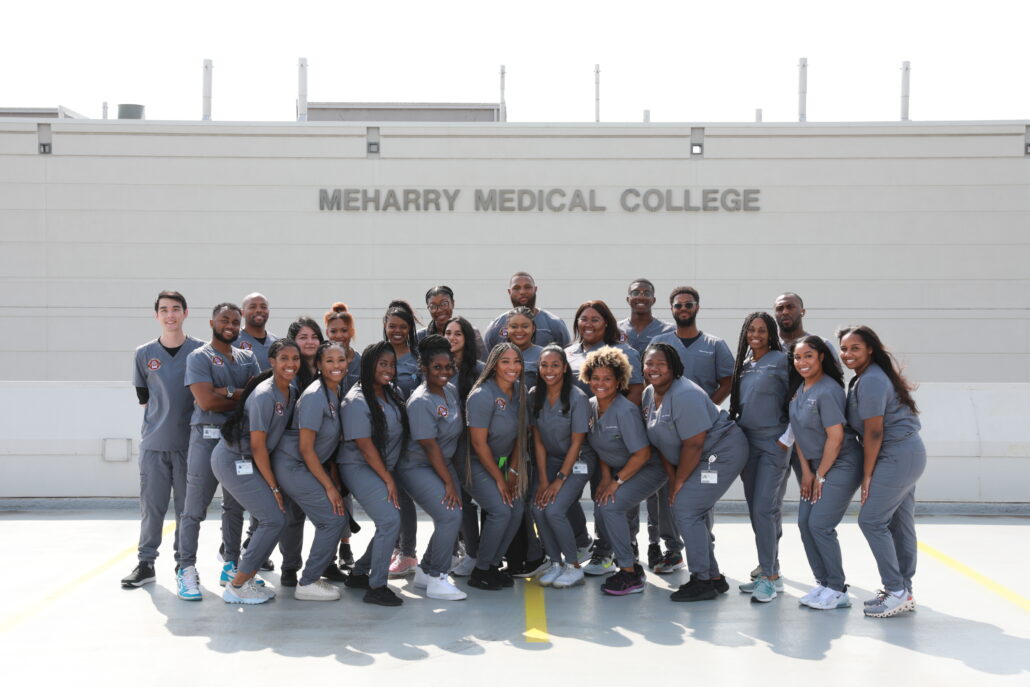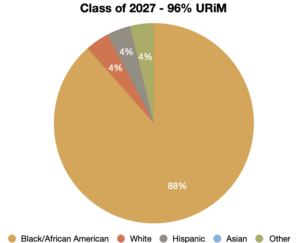Physician Assistant Sciences Department
The Physician Assistant Sciences Department seeks to produce physicians assistants who are equipped with the ability to practice cultural humility, provide compassionate care, and demonstrate a commitment to community service and lifelong learning.

Mission Statement
The mission of the Meharry Medical College Physician Assistant Sciences Program is to increase the number of students from underrepresented groups in medicine (URiM) into the PA profession. Students will be equipped with the ability to demonstrate cultural humility, provide evidence-based and compassionate care to all patients they encounter, and foster a commitment to community service in underserved populations, through equity, justice and lifelong learning.
Goals
1. To increase the number of students from underrepresented groups in medicine (URiM)* into the PA profession.
Metric: Admission’s data
Benchmarks: ≥85% of matriculated students are from URiM groups.
*The AAMC definition of underrepresented in medicine means those racial and ethnic populations that are underrepresented in the medical profession relative to their numbers in the general population.



2. To achieve high graduation rates.
Metric: Student Progress and Promotion Data
Benchmark: Annual graduation rate at or above the national average.
3. To maintain a competitive first-time PANCE pass rate.
Metric: NCCPA Program Data
Benchmark: Program annual first-time PANCE pass rate at or above the national average.
NCCPA Examination Performance:
The first-time Physician Assistant National Certifying Exam (PANCE) pass rates for the five most recent graduating classes as provided by the National Commission on Certification of Physician Assistants (NCCPA) compared to the national average are published annually for each class year. The NCCPA official report will be posted as it becomes available.

The Meharry Medical College Physician Assistant Sciences program intends to publish and make general program information readily available to enrolled and prospective students, including the most current annual NCCPA PANCE Exam Performance Summary each year. As the planned inaugural cohort will not be eligible for PANCE until late 2025, no data is currently available.
4. Promote faculty development and demonstrate teaching innovation, scholarship, and service.
Metric: School of Graduate Studies, and Faculty Performance Data AT Doc.
Benchmark: Annually, faculty will participate in at least one professional development opportunity and one external service opportunity and submit at least one conference presentation or journal article proposal.

Student Attrition

Diversity, Equity and Inclusion
Equity, Inclusion and Belonging Council (EIBC)
The mission of the Equity, Inclusion, and Belonging Council (EIBC) is to foster a diverse, inclusive, and equitable environment that promotes a sense of belonging among students, faculty, and staff. Guided by the values of respect, cultural humility, and collaboration, the EIBC is committed to:
- Reducing instances of implicit bias in faculty, staff, and student interactions and assessments
- Increasing cultural competence among faculty, staff, and students through targeted education.
- Addressing healthcare disparities in underserved communities by increasing faculty, staff, and student engagement in initiatives aimed at addressing and mitigating healthcare disparities
Through these efforts, the EIBC aims to empower individuals, cultivate diverse perspectives, and prepare future healthcare leaders to advocate for and serve all communities equitably.
PANCE Performance
The Meharry Medical College Physician Assistant Sciences program intends to publish and make general program information readily available to enrolled and prospective students, including the most current annual NCCPA PANCE Exam Performance Summary each year. As the planned inaugural cohort will not be eligible for PANCE until late 2025, no data is currently available.
Technical Standards
The Meharry Medical College PA Program requires that all students demonstrate the technical skills needed to complete the program’s didactic and clinical phases. The following skills are necessary to effectively evaluate and treat patients: critical thinking, effective communication, using computerized information technology, and visual, auditory, and motor skills.
Students who are unable to demonstrate the required technical standards needed to complete the PA curriculum may be dismissed from the program. As required by the Federal Disabilities Act, the PA program will make every attempt to provide students with the necessary accommodations.
Minimum Technical Standards
Critical Thinking: Students must possess the intellectual capabilities required to complete both the didactic and clinical curriculum and achieve competency. Critical thinking requires the intellectual ability to measure, calculate, synthesize, and analyze a large and complex volume of medical and surgical information. Students in the program must also be able to perform applicable demonstrations and experiments in the medical sciences.
Computer Technology Skills: Students must be able to utilize computerized information technology to access and manage on-line medical information, participate in computerized testing as required by the curriculum, conduct research, prepare multimedia presentations, and participate in the management of computerized patient records and assessments.
Communication Skills: Students must be able to speak clearly and effectively in order to elicit and relay medical information. They must also be able to communicate effectively and legibly in writing.
Visual Ability: Students must have the visual acuity needed to evaluate a patient during a physical exam and perform a wide range of technical procedures involved in the practice of medicine and surgery.
Hearing and Tactile Ability: Students must have the motor and sensory functions needed to elicit information from patients by palpation, auscultation and percussion, as well as perform a wide range of technical procedures involved in the practice of medicine and surgery.
Motor and Fine Skills: Students must be able to execute the physical movements required to maneuver in small places, calibrate and use equipment, position and move patients, and perform the technical procedures involved in the practice of medicine and surgery.
Interpersonal Ability: Students must possess a wide range of interpersonal skills, including but not limited to: the emotional health required for the management of high-stress situations while maintaining their full intellectual abilities, the ability to exercise sound judgment, the ability to complete all assigned patient care responsibilities; the ability to manage time (show up on time, begin and complete tasks on time); the ability to develop a mature, sensitive and effective relationship with medical colleagues, clinical and administrative staff, patients and families; the ability to identify, use, understand, and manage emotions in positive ways to relieve stress, communicate effectively, empathize with others, overcome challenges and diffuse conflict; and the ability to recognize your own emotional state and the emotional states of others, and engage with people in a way that draws them to you.
